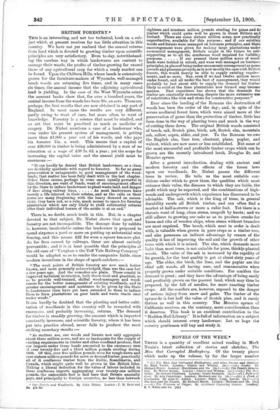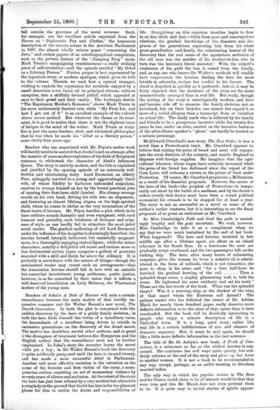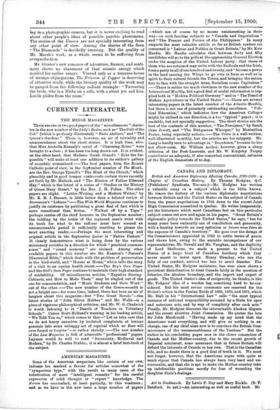NOVELS OF THE WEEK.*
THERE is a quantity of excellent mixed reading in Mark Twain's latest collection of stories and sketches, The Man that Corrupted Heidleyburg. Of the twenty pieces which make up the volume, by far the larger number * (1.) The Man that Corrupted Hadleyburg, and other Stories and Sketches. By Mark Twain. London : Chatto and Windus. [6s.]—(2.) Jezebel. By Richard Pryce. London : Hutchinson and Co. [6s.]—(3.) The liburth Genera- tion. By Walter Besant. London : Chatto and Wincing. [Cs.]—(4.) The New Order. By Oswald Cray/lard. London : Grant Richards. [Gs.]—(5.) Path and Goal. By Ada Cambridge. London : Methuen and Co. [68.]—(6.) A Prick of Conscience. By Alan St. Anbyn. London : Dlgby, Long, and Co. [Ss.]—(7.) The Seen and the Unseen. By Richard Marsh. London : Methuen and Co. [68.) --(13.) The Princess of Copper. By Archibald Clavering Gunter. London: F. V. White and Co. [es.]
fall outside the province of the novel reviewer. Such, for example, are the excellent article reprinted from the Forum on " Diplomatic Pay and Clothes," the humorous description of the riotous scenes in the Austrian Parliament in 1897, the almost wholly serious paper " concerning the Jews," and certain papers of an autobiographical complexion, such as the private history of the "Jumping Frog" story, Mark Twain's campaigning reminiscences—a really striking piece of self-revelation—and the episode entitled " My Debut as a Literary Person." Fiction proper is best represented by the ingenious story, or modern apologue, which gives its title to the volume. Therein we read how a cynical stranger, wishing to explode the reputation for rectitude enjoyed by a small American town, lured all its principal citizens, without exception, into a skilfully devised pitfall, which appealed at once to their greed and their vanity. The burlesque sketch, " The Esquimaux Maiden's Romance," shows Mark Twain in his most exuberantly farcical vein, while " My First Lie, and how I got out of it" is an excellent example of the ridendo dicere serum method. But whatever the theme or its treat- ment, it is good to notice that there is not the slightest trace of fatigue in the mind of the writer. Mark Twain at sixty- five is just the same fearless, alert, and whimsical philosopher that he was when he made his " debut as a literary person" some thirty-four years ago.
Readers who are acquainted with Mr. Puce's earlier work will hardly need to be assured that Jezebel is not an attempt, after the manner of some modern exploiters of the field of Scriptural romance, to whitewash the character of Ahab's infamous Queen. The story is entirely modern, and the title is explained and justified by the opening episode of an extremely well- written and entertaining story. Lord Dormoral, an elderly Peer, unhappily married to a young and aggravatingly timid wife, of whose fidelity he harbours unfounded suspicions, resolves to avenge himself on her by the brutal practical joke of naming their first-born child Jezebel. His clumsy revenge recoils on his own head, driving his wife into an elopement, and fastening an almost lifelong stigma on the high-spirited child, whom he comes to idolise as the very incarnation of the finest traits of his race. Mr. Pryce handles a plot, which in its bare outlines sounds fantastic and even repugnant, with such humour and geniality, such briskness of dialogue and crisp- ness of style, as can hardly fail to stimulate the most jaded novel reader. The gradual mellowing of old Lord Dormoral under the influence of his daughter is charmingly described; the heroine herself, intrepid, indiscreet, but essentially magnani- mous, is a thoroughly engaging central figure; while the minor characters, notably a delightful old nurse, and various more or less detrimental society types, comprise a gallery of portraits executed with a skill and finish far above the ordinary. It is probably in accordance with the nature of things—though the sentimental reader may resent such an arrangement—that the .Amazonian heroine should fall in love with an amiable but somewhat invertebrate young nobleman ; poetic justice, however, is so far consulted by their union that it inflicts a well-deserved humiliation on Lady Malmsey, the Pharisaical mother of the young man.
Readers of Jokai's A Debt of Honour will note a certain resemblance between the main motive of that luridly im- pressive romance and Sir Walter Besant's new novel, The Fourth Generation. In both the plot is concerned with the sudden discovery by the hero of a grisly family skeleton ; in both the hero finds himself the victim of a hereditary curse, the descendants of a murderer being driven to suicide in successive generations- on the discovery of the dread secret. The motive has doubtless served other authors, and so great is the divergence of treatment between the Hungarian and the English author that the resemblance need not be further emphasised. In Jokai's story the narrator learns the secret while yet a boy; in Sir Walter Besant's book the discovery is quite artificially postponed until the hero is six-and-twenty, and has made a most successful abut in Parliament, Another and more effective variation is the retention on the scene of the founder and first victim of the curse, a nona- genarian recluse, expiating an act of momentary violence by seventy years of silence and seclusion. At the outset of the story the hero has just been refused by a very modern but attractive younglady on the ground that his lot has lain infer too pleasant places for him to realise the duties and responsibilities of life. Straightway on this rejection troubles begin to flow in on him thick and fast,—visits from poor and unscrupulous relations, the gradual knowledge of the disasters and dis- graces of the generations separating him from his silent great-grandfather, and finally, the culminating horror of the discovery that the real cause of the mysterious seclusion of the old man was the murder of his brother-in-law, who in turn was the heroine's lineal ancestor! With the culprit's confession of his guilt the ban is raised from the family, and, as any one who knows Sir Walter's methods will readily have conjectured, the heroine, finding the hero far more lovable in adversity, revises her verdict in his favour. The cloud is dispelled as quickly as it gathered ; indeed, it may be fairly objected that the incidents of the story are far more symmetrically arranged than in real life. But really, though the setting of the story is unmitigatedly modern, and hero and heroine ride off to examine the family skeleton, not on horseback, but on their bicycles, one cannot but regard it as more of a veiled allegory than a transcript from or variation on actual life. The shady uncle who is believed by his family and friends to be a prosperous barrister while for twenty-five years he has, under an alias, carried on the lucrative business of the after-dinner speaker's " ghost," can hardly be treated as a serious personage.
Mr.10awald Crawfurd's new story, The New Order, is less a novel than a Protectionist tract. Mr. Crawfurd appears to believe that raising the price of bread and meat will repopu- late the rural districts of the country, and enable England to dispense with foreign supplies. He imagines that the agri- cultural labourer, whose wages have certainly increased while the price of his bread has deereased since the repeal of the Corn Laws, will welcome a return to the prices of food under Protection. Of course, Mr. Crawfurd prophesies a Millennium as a result of his financial proposals. However, the career of the hero of the book—the prophet of Protection—is tempo- rarily cut short by the bullet of a madman, and by the doctor's orders (surely that doctor must have been a sound political economist) his crusade is to be stopped for at least a year. The story is not as successful as a novel as some of the author's earlier ventures, but it is interesting to see the fiscal proposals of so great an enthusiast as Mr. Crawfurd.
In Miss Cambridge's Path and Goal the path is exceed- ingly lengthy and the goal uncertain. We wish, however, Miss Cambridge to take it as a compliment when we say that we were much tantalised by the end of her book. What happened ? The hero and heroine, reunited in late middle age after a lifetime apart, are afloat on an island schooner in the South Seas. In a hurricane the crew are gradually swept overboard, and the two passengers left on the sinking ship. The hero, after many hours of exhausting suspense, gives the woman he loves a sedative (it is admin- istered in the form of tabloids, which is not romantic) ; she goes to sleep in his arms, and " for a bare half-hour he watched the gradual drawing of the veil Then a splendid shape arose, a mighty glimmering wall, to hide the scene. He tightened his arms suddenly and set his teeth." These are the last words of the book. What was the splendid shape? Was it a rescuing ship, or the shadow of the wing of that angel whom the Easterns call Azrael ? The patient reader who has followed the career of Dr. Adrian Black for nearly three hundred pages really deserves more definite information as to the close of that career than is here vouchsafed. But the book will be decidedly interesting to people who enjoy a minute description of life in a Cathedral town. It is a long, quiet story, rather like real life in a certain indefiniteness of aim and absence of dramatic sequence. But, it must be said again, we should like a little more definite information in the last sentence.
The title of Mr. St. Aubyn's new book, A Prick of Con- science, is a misnomer so far as the wicked heroine is con- cerned. She continues her evil ways quite quietly, but sud- denly reforms at the end of the story and gives up her lover to another woman. It is not a book to be recommended in any way, except, perhaps, as an awful warning to frivolous married ladies.
The only way in which the psychic stories in The Seen and the Unseen could claim to be of interest would be that they were true, end this Mr. Marsh does not even pretend them to be. It is quite easy to invent stories of spirits appear-
kg in a photographic camera, but it is never exciting to read about other people's ideas of possible psychic phenomena. The stories of the Unseen are not specially interesting from any other point of view. Among the stories of the Seen " The Diamonds " is decidedly amusing. But the quality of Mr. Marsh's work, as a whole, seems to be suffering from overproduction.
Mr. Gunter's new romance of adventure, finance, and senti- ment shows no abatement of that seismic energy which marked his earlier essays. Viewed only as a treasure-house of strange objurgations, The Princess of Copper is deserving of attentive study, while the literary quality of the work may be gauged from the following radiant example : " Favouring the bride, who is a Niobe on a sofa, with a sweet yet sad kiss, Lucile glides from the room."








































 Previous page
Previous page